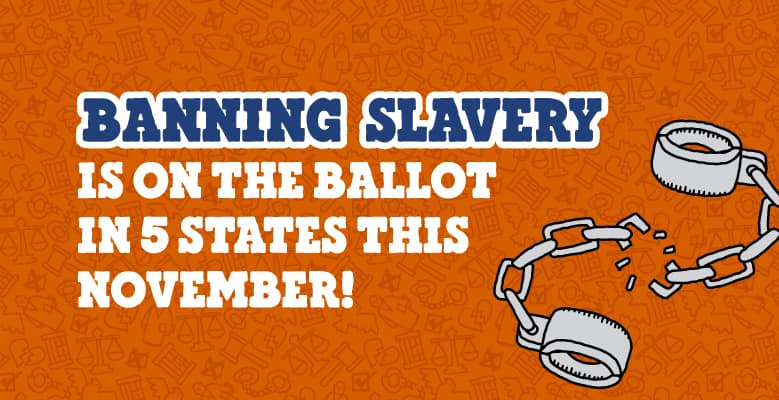November 4, 2022

Believe it or not, banning slavery is on the ballot in 5 states this November. Yes, slavery.
You’re probably thinking, banning slavery is obviously a good thing but… wasn’t it abolished a long time ago? It was—well, sort of. The 13th Amendment did outlaw slavery back in 1865, EXCEPT as punishment for someone convicted of a crime. That meant that incarcerated people could be forced to work without pay while they were in prison. (In the 1870s, Black people made up 95% of the prison population in Southern states.)
Fast-forward to today and 19 states still have language in their constitutions that allows slavery or involuntary servitude (and Black people are incarcerated in state prisons at five times the rate of white people). This year, five of them are asking voters to change that.
A Very Brief History of How We Got Here
Before we get to what’s happening in those five states, a little context might be helpful.
The so-called slavery loophole in the 13th Amendment wasn’t conceived of or enacted in a vacuum. If we think that allowing slavery to continue by another name in the years after the Civil War was somehow simply an unfortunate error or oversight, then we misunderstand the roots of the American criminal legal system.
The first organized police forces in the South were created in the 1700s as slave patrols, to hunt down enslaved people who’d escaped to find freedom. Police departments in the North were created in the early 19th century to control immigrants, workers, and Black people who had been presumed freed. When the Civil War came to an end, police were put to work to maintain the antebellum racial hierarchy by any means necessary. They enforced Black Codes, laws passed with the intention to control and criminalize Black Americans. These laws ensured that Black people could be arrested and imprisoned for a host of petty infractions—which, thanks to the 13th Amendment, meant that a form of slavery could continue behind prison walls. This is the legacy voters have a chance to overturn on November 8.
Alabama
Vote YES on the Alabama Recompiled Constitution Ratification Question
When the current Alabama state constitution was last revised, in 1901, those writing it made their intentions very clear: “To establish white supremacy in this state.” No surprise, then, that Alabama’s constitution includes a lot of racist language throughout, as well as a section that explicitly allows for involuntary servitude as punishment for crime.
Alabama voters have an opportunity this November to change that. Vote YES on the Alabama Recompiled Constitution Ratification Question to approve a revised constitution that removes all racist (and sexist and generally offensive) language and eliminates that slavery loophole.
Louisiana
Vote NO on Amendment 7
Louisiana is a strange case. In Amendment 7, Louisiana voters are being asked this year if they want to remove language from the state constitution that allows slavery and involuntary servitude.
BUT Amendment 7 also adds confusing new language that says the prohibition of slavery and involuntary servitude “does not apply to the otherwise lawful administration of criminal justice.” What to do? Well, the original proposer of the amendment, Rep. Edmond Jordan, D-Baton Rouge, has said himself that while his goal was to ban slavery in the constitution, the wording of the ballot measure led to “a lot of confusion.”
He vowed to draft a new measure to bring before voters in the future, but is now urging Louisianans to oppose Amendment 7, and we are too. Please vote NO!
Oregon
Vote YES on Measure 112
Oregon goes farther than simply asking voters to approve changes to the constitution to outlaw slavery and involuntary servitude.
Its ballot measure links the legacy of slavery to mass incarceration—if Oregonians vote YES on Measure 112, it will authorize Oregon courts or probation or parole agencies to consider alternatives to incarceration for anyone convicted of a crime. We’d like to see a lot more of this! As important as banning slavery in 2022 is from a symbolic standpoint, it’s even more important to use this opportunity to change racist policies while we’re changing racist language.
Tennessee
Vote YES on Constitutional Amendment 3
Tennessee’s ballot measure is very straightforward.
Tennessee Constitutional Amendment 3 proposes changing the current language in the state constitution—“slavery and involuntary servitude, except as a punishment for crime, whereof the party shall have been duly convicted, are forever prohibited in this state”—with new language that says unequivocally that “slavery and involuntary servitude are forever prohibited in this State.”
Vermont
Vote YES on Proposal 2
We’ll admit to being surprised when we discovered that our home state’s constitution had language saying that persons could be held as servants, slaves, or apprentices with the person's consent or "for the payments of debts, damages, fines, costs, or the like."
If voters vote YES on Proposal 2, that language will be replaced with “slavery and indentured servitude in any form are prohibited.” Sounds much better to us.
Be a Voter!
If you think it’s absurd that Alabama, Louisiana, Oregon, Tennessee, Vermont, and 14 other states still allow slavery in their constitutions, then make sure you vote! (And keep voting, right down the entire ballot!)
Your vote is your power.

Register to vote!
Sweeten Up Your Inbox!
Subscribe Now And We'll Make Sure You Get The Inside Scoop On Ben & Jerry's Fun And Flavors! It's Like Dessert For Your Inbox, And You're Going To Want Seconds.


